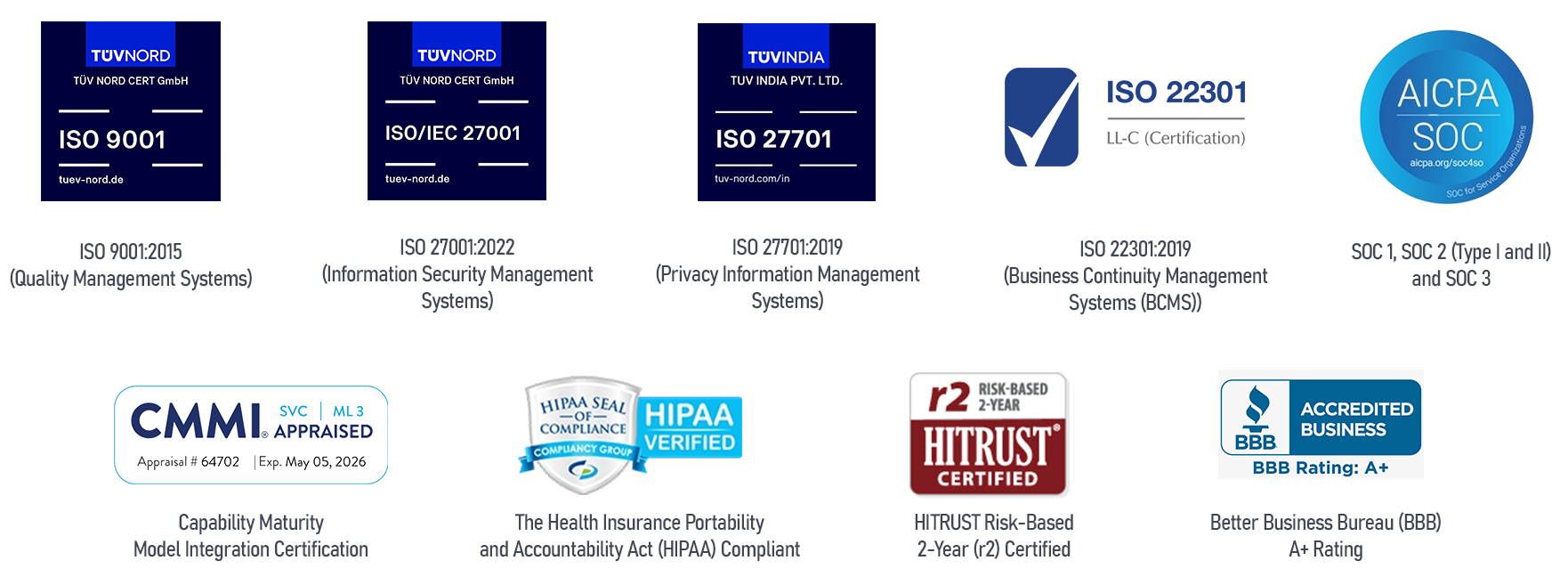Safeguarding Financial Health in the Digital Healthcare Era
In today’s digital-first healthcare landscape, healthcare organizations are more than just care providers. They are custodians of sensitive patient data. This information forms the backbone of two critical operations: Revenue Cycle Management (RCM) and Cybersecurity.
These domains are deeply interconnected, and their synergy is essential for ensuring both operational continuity and financial stability. In this post, we explore why safeguarding healthcare data through strong cybersecurity practices is an indispensable part of effective RCM.
The Cybersecurity Challenge in Healthcare
Healthcare has become a top target for cyber-attacks due to the high value patient data, which is widely traded on the black market. Cyber threats such as ransomware, phishing, and data breaches can cripple RCM systems, leading to operational downtime, regulatory penalties, and diminished patient trust ultimately resulting in lost revenue.
Here’s how focusing on cybersecurity directly impacts key RCM functions:
- Data Integrity and Accuracy
Accurate patient information is essential for billing, coding, and claims processing. Cyberattacks can corrupt or manipulate data, resulting in billing errors, claim denials, and payment delays.
- Operational Continuity
Ransomware can freeze critical systems, halting RCM functions for extended periods. On average, it takes over 300 days to identify and contain a breach, with recovery costs often exceeding $1.85 million.
- Regulatory Compliance
Laws such as HIPAA (Health Insurance Portability and Accountability Act of 1996) mandate the protection of health information. Cybersecurity failures can lead to non-compliance, exposing healthcare providers to fines, audits, and reputational damage.
- Patient Trust and Retention
A single security breach can severely damage patient trust, resulting in up to a 25% drop in business due to dissatisfaction.
Key Cybersecurity Measures for Effective RCM
To shield the revenue cycle from cyber threats, we at HealthRecon Connect implement proactive and layered cybersecurity strategies. Key measures include:
- Data Encryption
- All sensitive data is end-to-end encrypted, ensuring that even if intercepted, the information remains inaccessible.
- Strict Access Controls
- Access to critical systems is tightly regulated, allowing only authorized personnel to handle sensitive data in secured environments.
- Regular Audits & System Monitoring
- Continuous system monitoring and routine security audits help detect vulnerabilities before they are exploited, prioritizing prevention through proactive measures.
- Employee Training in Security Management
- Ongoing training ensures that staff can recognize phishing attempts, malware, and other threats, reducing human error.
- Incident Response Plan
- A holistic response plan that accounts for various risk scenarios ensures quick action in the event of a breach, minimizing disruptions and protecting operations.
Role of AI & Machine Learning
At HealthRecon Connect, we use Artificial Intelligence (AI) and Machine Learning (ML) to significantly enhance both cybersecurity and RCM efficiency:
- Anomaly Detection: Our in-house AI tools flag unusual behavior patterns, which may signal attempted breaches.
- Automation: Repetitive tasks such as billing and coding are automated to reduce human error and streamline general operations.
- Predictive Analytics: Past data trends are used to forecast and mitigate potential threats before they occur in an preventive manner.
Our Commitment to Information Security
“At HealthRecon Connect, protecting our clients’ data and ensuring patient privacy are paramount.”
– Denver Fernando, CEO, HealthRecon Connect
At HealthRecon Connect, we are deeply committed to upholding the highest standards of information security and operational resilience. We hold a comprehensive portfolio of certifications that reinforce this commitment:
These certifications and compliance frameworks emphasize our focus on:
- Continuous compliance with evolving regulatory standards
- Integrated risk, privacy, and incident management
- Operational continuity, even during disruptions
- Transparent performance measurement aligned with security objectives
This comprehensive approach places HealthRecon Connect at the forefront of healthcare cybersecurity, enabling our clients to deliver care with confidence while we safeguard their critical data and revenue infrastructure.
The Bottom Line
Cybersecurity is now a non-negotiable pillar of healthcare RCM. A secure system ensures:
- Protection of patient data
- Continuity of operations
- Regulatory compliance
- Long-term trust and revenue growth
Investing in cybersecurity is investing in your revenue cycle. With HealthRecon Connect, you’re not just managing revenue, you’re protecting your future.
References
- HFMA (Healthcare Financial Management Association)
Cyberattack on Change Healthcare brings turmoil to healthcare operations nationwide
https://www.hfma.org/technology/cybersecurity/cyberattack-on-change-healthcare-brings-turmoil-to-healthcare-operations-nationwide/ - HealthRecon Connect
Information Security Policy
https://www.healthreconconnect.com/information-security-policy/ - HealthRecon Connect
The Game-Changer: Artificial Intelligence in Revenue Cycle Management
https://www.healthreconconnect.com/game-changer-artificial-intelligence-in-revenue-cycle-management/ - Becker’s Hospital Review
Hackers pose as hospital revenue cycle workers to trick IT staff
https://www.beckershospitalreview.com/cybersecurity/hackers-pose-as-hospital-revenue-cycle-workers-to-trick-it-staff.html - Healthcare IT News
Financial/Revenue Cycle Management Resource Center
https://www.healthcareitnews.com/category/resource-topic/financialrevenue-cycle-management - The HIPAA Journal
Why Is HIPAA Important?
https://www.hipaajournal.com/why-is-hipaa-important/


